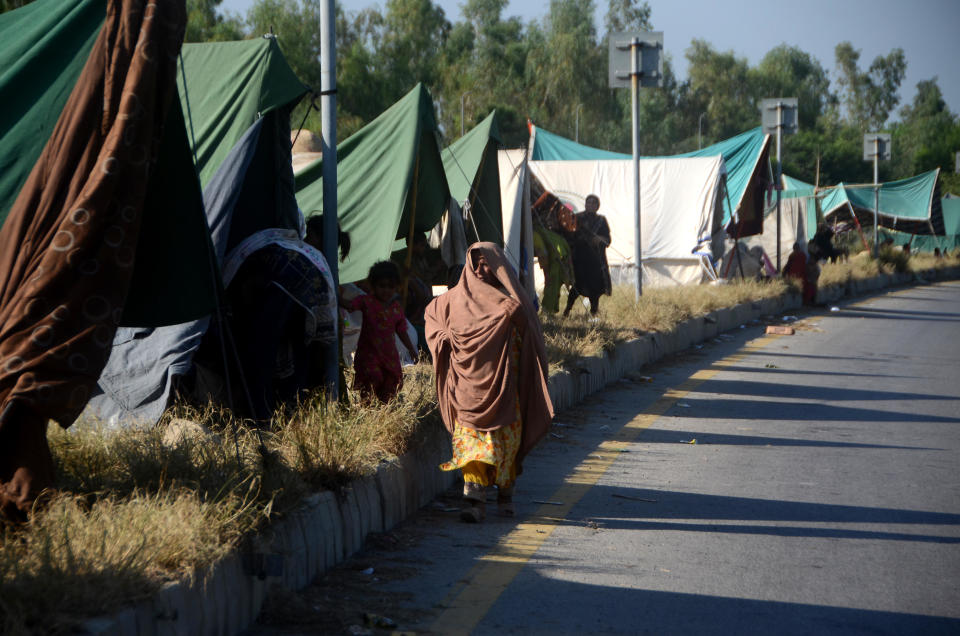José Andrés, global leaders team up to address climate change-related migration
- Oops!Something went wrong.Please try again later.
- Oops!Something went wrong.Please try again later.
- Oops!Something went wrong.Please try again later.
- Oops!Something went wrong.Please try again later.
- Oops!Something went wrong.Please try again later.
- Oops!Something went wrong.Please try again later.
Hurricanes are ravaging the Caribbean. Flooding has left vast areas of Pakistan underwater. Drought continues to ravage Africa and parts of the Middle East. And the shifting weather patterns are driving tens of millions of people from their homes — with more than 200 million people expected to be displaced by climate-related disasters by 2050.

But a diverse group of leaders, thinkers and activists, including chef José Andrés, former cabinet secretaries Leon Panetta and Janet Napolitano and several former presidents and big-city mayors, will meet for the first time this week on the sidelines of the United Nations General Assembly in New York to try to force world leaders to start thinking about how migration caused by climate change can be addressed.
The Climate Migration Council, launched by Laurene Powell Jobs and her Emerson Collective, includes Michael Chertoff and Janet Napolitano — two former homeland security secretaries who oversaw U.S. immigration policies — plus Leon Panetta, who served as CIA director and defense secretary. There's also Michael Morell, a former CIA deputy director and CBS News national security contributor; San Diego Mayor Todd Gloria; the former presidents and mayors of Costa Rica and Bogotá, Colombia; and Luis Almagro, secretary general of the Organization of American States.
"This is not a topic that governments like to entertain because they want to preserve the sovereignty of their borders. It's a hard conversation to have, but it's one that if we're going to be responsible about how we manage this large-scale flow of people, we need to get on top of it," said Marshall Fitz, managing director of immigration for the Emerson Collective, who will help run the new climate group.
Immigration policy remains one of the great unsolved policy challenges in the United States — an issue thrust back into the national conversation in recent days by Republican governors who've sent buses and planeloads of migrants to Washington and Massachusetts. Most of those crossing the U.S.-Mexico border are coming from across Central and South America, compelled to leave due to broad political and economic strife, but many are also fleeing rural farming areas where farming has become difficult because of drought or extreme weather.
Climate-caused immigration "is gasoline on the fire of all the forces that have already put migration at historic levels today," Fitz said. "We're seeing the greatest number of people on the move. Climate is an immovable force that's going to drive decisions where people are on the cusp."
Fitz said the group plans to meet Tuesday to begin sorting out how it can force discussions about climate-compelled immigration on the global stage. The short-term goal is to get it onto the agenda of the annual United Nations climate change conference, which takes place in November in Cairo, or at least to hold less formal gatherings on the sidelines of the confab with leaders in attendance.
Marta Lucia Ramirez, former minister of foreign affairs of Colombia, said she's joining the new council because it's "urgent to work together to find solutions at all levels of society, exercising responsible leadership from governments more effectively."
Roberta Jacobson, the former U.S. ambassador to Mexico who handled Western Hemisphere affairs for the Obama administration, said she's joining because the number of people being forced to flee their homes because of climate change "will only increase, creating further pressure on an international system that is already confronting unprecedented levels of displaced people. We need bold action at the local, national, regional, and international levels."
And Andrés said his travels around the world leading his World Central Kitchen organization that provides free meals to refugees and people displaced by natural disasters, has shown him "how climate change and catastrophic weather events have destroyed communities and upended lives."
"Our world needs real solutions on climate change that invest in local communities and build longer tables, not higher walls," he said.
"We're not going to have the type of pressure campaign to force this into the international agenda without having kind of blue-chip leaders really showing the breadth and depth of the interest in solutions here," Fitz said.
Tina Brown on the historic significance of Queen Elizabeth II's state funeral
Watch: "God Save the King" is sung at the end of Queen Elizabeth II's funeral
Watch: Queen Elizabeth II's state funeral service at Westminster Abbey
